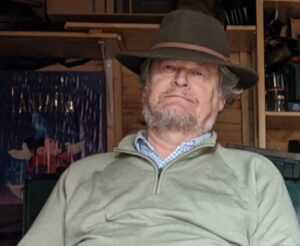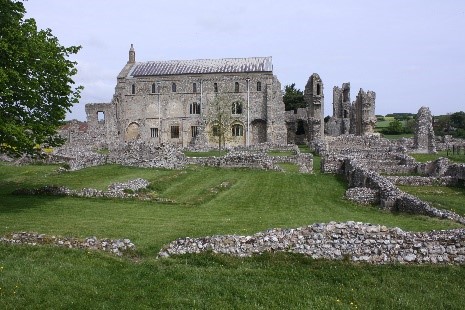22 April 2021
Lacking Faith
A Church ruined?
by J.R. Thomas
 In the 1950’s things were very different. The Church of England was still pretty much the Conservative Party at prayer, Archbishops and Bishops generally kept well clear of politics, and concentrated on matters of spirituality and faith. Most parish rectors formed a sort of local spiritual support system – and had plenty of time to do it, most having but one or perhaps two parishes to look after. There was of course the odd Red Dean, the oddest being Hewlett Johnson, Dean of Canterbury, a member of the Communist Party and a supporter of the Soviet Government, a gift to cartoonists and satirists as he appeared to know little about the causes he espoused but was always willing to sound off noisily to support far left politics.
In the 1950’s things were very different. The Church of England was still pretty much the Conservative Party at prayer, Archbishops and Bishops generally kept well clear of politics, and concentrated on matters of spirituality and faith. Most parish rectors formed a sort of local spiritual support system – and had plenty of time to do it, most having but one or perhaps two parishes to look after. There was of course the odd Red Dean, the oddest being Hewlett Johnson, Dean of Canterbury, a member of the Communist Party and a supporter of the Soviet Government, a gift to cartoonists and satirists as he appeared to know little about the causes he espoused but was always willing to sound off noisily to support far left politics.
In return the Conservative Party was closely associated with the established church, a conservative old fashioned Church of England. Generally the Labour Party was seen as a product of Methodism as much as Marxism; the fear in both religious and political circles was of those reds who had other loyalties. This was more pronounced in the USA than in the UK, where Senator Joe McCarthy was devoted to rooting out Leftists and Marxists wherever he found them, in Hollywood (his most famous victim probably Charlie Chaplin, who removed himself to Switzerland), and in the State Department and Army. Things were rather different in the UK. Though Whitehall and Westminster gossip suggested that some beds were suspected of concealing lurking reds, not a lot was done to actually pull any suspects out. Not at least until Burgess and MacLean left for Moscow, after which whispering intensified, occasionally justified by another defection. MI6, it should be said, suspected almost everybody, not least its own chief and Harold Wilson. But not the Archbishop of Canterbury.
So what has changed? We are still suspicious of what strange influences the Russian government may be having on our lives. Did they try to manipulate the election of Hillary Clinton in 2016? Did they put Donald Trump in the White House? Would procuring the election of Joe Biden have been the greatest coup of all? (“No”, “No”, and “Probably, but they didn’t” being the correct answers.) In the UK there are theories that Mr Putin tried, or succeeded, to get the “Leave” result in the Referendum and is up to the same game in Scotland. That must mean the Russian President is playing for a sure win, as leading RTE broadcasters Alex Salmond and George Galloway are campaigning on opposing sides.
But we seem to have hardly noticed the equally dramatic change in the political orientation of the Anglican church. If 1950’s Anglicanism was the Conservative Party at prayer, the modern church seems to be moving towards being Momentum at Mass. Over seventy years, quasi socialist views have achieved almost complete acceptance by the clergy of the Church of England. Within the C of E it now must be almost impossible to find a Tory supporting cleric at any level, certainly one who will admit to such heretic tendencies. Honourable mention though to Giles Fraser, a London vicar who whilst not perhaps an out and out Tory is at least prepared to see merits in conservatism and older proven ways of doing things; and for standing up to be counted. But the Anglican Church has gradually bent the knee, or taken the knee we should say, to the socialist tendency in religion. Not only that, it eagerly adopts every change and fashion and passing trend, somewhat, one might think, at odds with its message of God, Eternal, Strong, Unchanging. In this it has left behind areas where congregations are still growing and Christianity is still strong, as in Africa and the Far East. Not that their eminences of Canterbury and York seem very interested in the wider church; they raise little protest to the ill-treatment of Christians from absolutists in the Middle East and from other religions in Pakistan, where Anglicans are dying for their faith, and are positively embarrassed by some of their brothers in Africa, who tend not to endorse the English Synod’s views on sexuality and politics generally. It is indeed odd that an organisation that campaigns so vigorously against white supremacy and urges its western congregations to admit guilt for almost every aspect of western civilisation, should remain so firmly supreme over the greater numbers of adherents outside the British Isles who are uncomfortable with the trendyism of the English church leadership. It is hard to imagine, for example, Archbishop Welby looking to yield his leadership of the world-wide Anglican communion to Archbishop Ndukuba of Nigeria. The Nigerian Anglican church has a weekly congregation many times that of its English sister church, but its Archbishop holds views that are not acceptable on homosexuality (and rightly not). But there are many impressive leaders of the Anglican church who might provide inspirational leadership. Religion should of course be about revealed truth and not maximising the numbers in the pews, but how does a modern western church equate its societal views with maintaining spiritual and synodical leadership over far more dynamic but spiritually traditional churches elsewhere?
Intervening in politics is always dangerous for the church. Capitalism is a cause so unfashionable that it has become the chosen epithet of those of leftish leanings, and increasingly is avoided even by business people, let alone Tories, so one would not expect to find many clergyman picking up such a cause. And perhaps that is not such a sin; China is often described as a capitalist country, and capitalism has served it well over the last twenty years. But the Red China version of capitalism is not what we might call “free enterprise”. Or indeed free anything. “Freedom” itself is on the way to becoming a dirty word, freedom morphing into a word meaning behaving badly and abuse of fellow citizens. Of course, it doesn’t, but the increasingly violent and noisy protest groups of the West would have us believe that freedom is a major threat to a fairer society. One of the philosophical problems of freedom is how conflicts in a free society are best resolved, and some of those conflicts are tricky. Here the church ought to have a voice. If only that conflicts of freedom will not be resolved by burning cars and buildings, nor in assaulting or defunding the police. What is for sure though is that by keeping quiet and not engaging in the debate, both church and the silent majority, as Richard Nixon called those who ignore the debate, who prefer enjoying their comforts to fighting for them, or who laugh in disbelief behind closed doors, are losing the struggle. The silent majority may have voted for Boris last time, but the battle of the political ideas is being lost by the Tories, and in the end that will do to Conservatism what it has done to a faith based church. The Church has largely lost its way because it decided to get involved in politics for their own sake, instead of sticking robustly to preaching faith and spirituality. Those who support freedom, in all walks of life, need to start preaching the virtues of a free society, free speech, free enterprise, whilst they have the freedom to do it. And also to start praising all those things which ought to come with freedom: tolerance, friendship, peaceful coexistence, generosity, understanding, patience, compromise, that a happy life is more important than an abundance of material possessions. The sort of thing the Church used to say.


